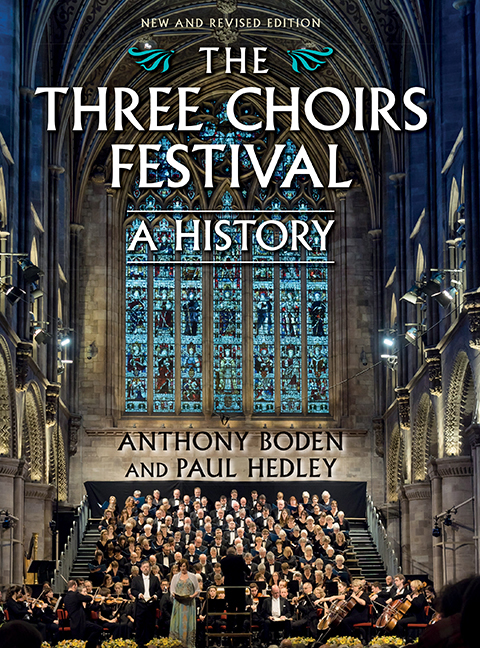Book contents
- Frontmatter
- Contents
- List of Illustrations
- Preface
- Acknowledgements
- List of Abbreviations
- List of Cathedral Organists
- 1 Origins
- 2 A Fortuitous and Friendly Proposal
- 3 A Numerous Appearance of Gentry
- 4 ‘The Musick of my Admiration Handel’
- 5 The Gentlemen and the Players
- 6 Avoiding Shipwreck
- 7 Prima voce
- 8 Favourites and Flops
- 9 Sacred and Profane
- 10 Froissart
- 11 The Unreasonable Man
- 12 The Dream
- 13 Beyond these Voices
- 14 An Essentially English Institution
- 15 The Elgar Festivals
- 16 Dona nobis pacem
- 17 Recovery
- 18 Association
- 19 A New Epoch
- 20 Jubilee
- 21 Theme with Variations
- 22 Houses of the Mind
- 23 ‘A Gold-Plated Orchestra’
- 24 A New Millennium
- 25 Reorganisation
- 26 An Invitation to the Palace
- Appendix Three Choirs Festival Timeline
- Select Bibliography
- Index
- Plate section
6 - Avoiding Shipwreck
Published online by Cambridge University Press: 11 August 2017
- Frontmatter
- Contents
- List of Illustrations
- Preface
- Acknowledgements
- List of Abbreviations
- List of Cathedral Organists
- 1 Origins
- 2 A Fortuitous and Friendly Proposal
- 3 A Numerous Appearance of Gentry
- 4 ‘The Musick of my Admiration Handel’
- 5 The Gentlemen and the Players
- 6 Avoiding Shipwreck
- 7 Prima voce
- 8 Favourites and Flops
- 9 Sacred and Profane
- 10 Froissart
- 11 The Unreasonable Man
- 12 The Dream
- 13 Beyond these Voices
- 14 An Essentially English Institution
- 15 The Elgar Festivals
- 16 Dona nobis pacem
- 17 Recovery
- 18 Association
- 19 A New Epoch
- 20 Jubilee
- 21 Theme with Variations
- 22 Houses of the Mind
- 23 ‘A Gold-Plated Orchestra’
- 24 A New Millennium
- 25 Reorganisation
- 26 An Invitation to the Palace
- Appendix Three Choirs Festival Timeline
- Select Bibliography
- Index
- Plate section
Summary
IN its long history, Three Choirs has not always sailed in untroubled waters. In the nineteenth century it sometimes appeared that the Festival was steering an uncertain course between the opposing fleets of High and Low Church, and in danger of foundering upon the rocks thrown up by those who sought to banish it from the cathedrals altogether.
It is difficult for us to imagine that a music festival should generate controversy and rancour; but Three Choirs is as inseparable from the cathedrals of Gloucester, Hereford and Worcester as religion was from nineteenth-century England. It was religion, the Christian religion, which permeated every aspect of life: political, educational, social, artistic and scientific. Some discord was inevitable.
One of King George IV's subjects whose opposition to the Festival was expressed almost as strongly as his protest against the way in which the country was being governed, was the Radical reformer William Cobbett. For a decade after the rout of Napoleon at Waterloo, depression and political reaction gripped England. Poverty and distress were widespread. Between 1822 and 1826 Cobbett made a number of journeys through the southern counties, on horseback, to see for himself the condition of the people and the changes in the countryside. His arrival at Gloucester in 1826, recorded in his diary account, Rural Rides, coincided with Three Choirs.
From Stroud I came up to PITCHCOMB, leaving PAINSWICK on my right. From the lofty hill at PITCHCOMB I looked down into that flat and almost circular vale, of which the city of gloucester is in the centre. To the left I saw the SEVERN, become a sort of arm of the sea; and before me I saw the hills that divide this county from Herefordshire and Worcestershire. The hill is a mile down. When down, you are among dairy-farms and orchards all the way to Gloucester, and, this year, the orchards, particularly those of pears, are greatly productive. I intended to sleep at Gloucester, as I had, when there, already come twenty-five miles, and, as the fourteen which remained for me to go, in order to reach BOLLITREE, in Herefordshire, would make about nine more than either I or my horse had a taste for.
- Type
- Chapter
- Information
- The Three Choirs Festival: A HistoryNew and Revised Edition, pp. 87 - 102Publisher: Boydell & BrewerPrint publication year: 2017

